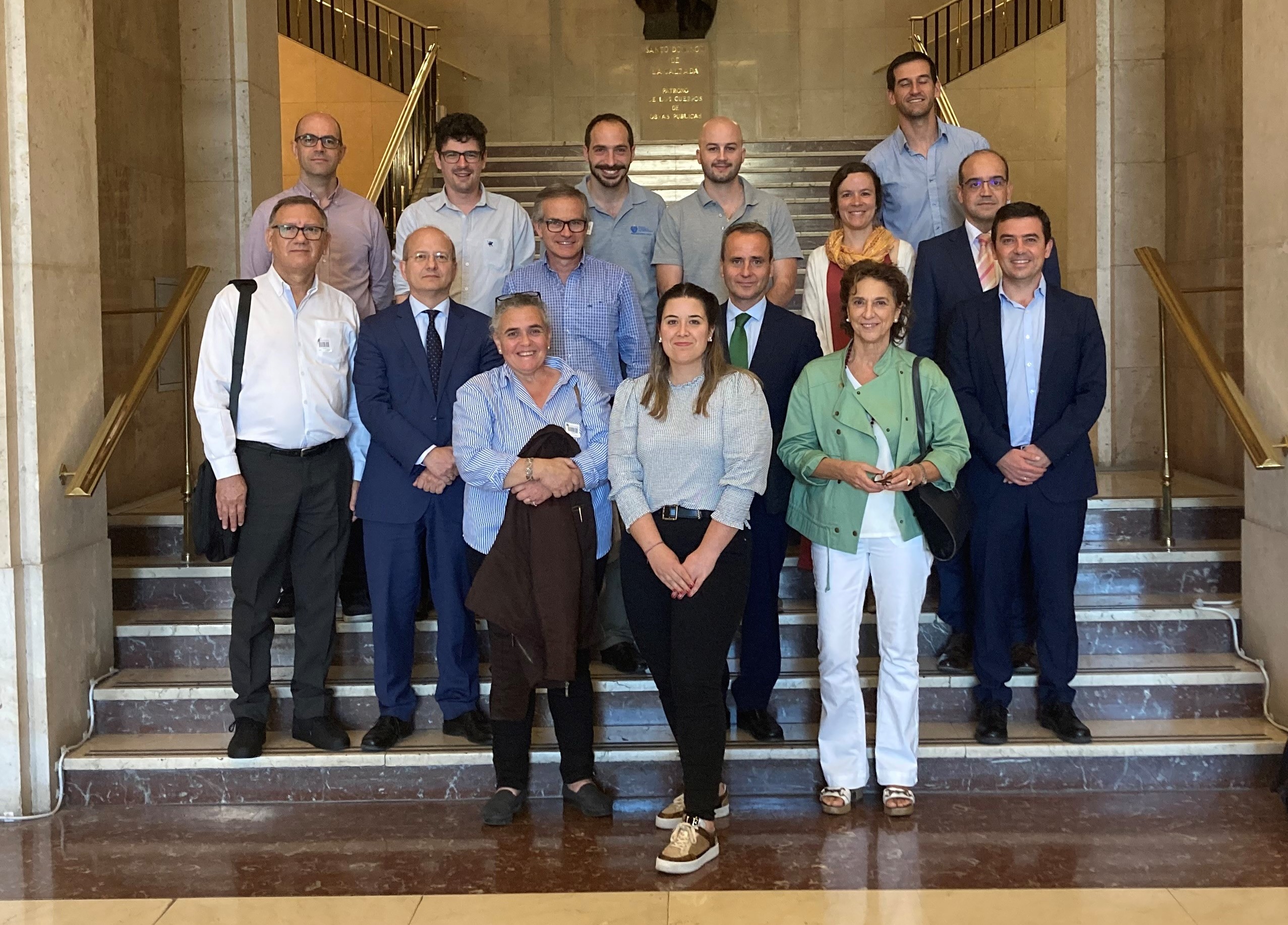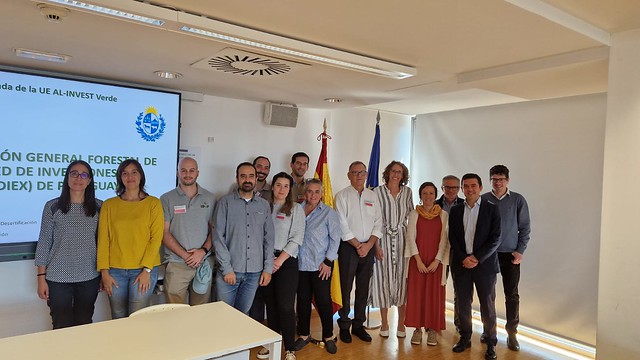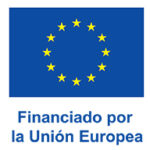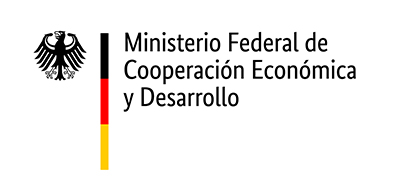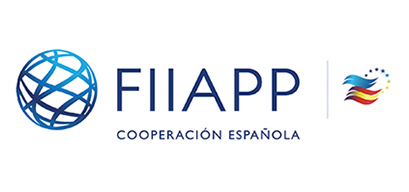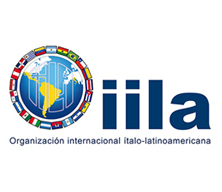Madrid, 13 October 2023. A delegation of technicians from the Directorate General of Forestry of the Ministry of Livestock, Agriculture and Fisheries (DGF-MGAP) of Uruguay and the Investment and Export Network (REDIEX) of the Ministry of Industry and Trade of Paraguay visited Spain from 25 to 29 September to learn about agroforestry certification experiences. The visit was part of the technical assistance provided by the Component 2 AL-INVEST Verde, led by FIIAPP in consortium with IILA, lends to both institutions through IDAF (Centro de Investigaciones Aplicadas al Desarrollo Agroforestal).
It is hoped that the initiatives visited will contribute to the design of a certification system for agro-export products from farms that sustainably manage native forests in Uruguay, as well as to Paraguay's knowledge of European strategies for the certification of forest products. To this end, five certification experiences promoted by Paraguayan entities were visited. public and private sphereswhere delegations were able to learn about their approaches to certification.
The mission began with various meetings with technicians from the Spanish Ministry for Ecological Transition and the Demographic Challenge. Meetings were held with the Subdirectorate General for Forestry Policy and Combating Desertification, with the Subdirectorate General for Terrestrial and Marine Biodiversity and with the Directorate General for Forestry Planning and Management of the Xunta de Galicia.
At the meetings, information was shared on regulatory and policy instruments for forest management and planning, forest certification systems or the European Union regulation on deforestation and forest degradation-free supply chainsamong other issues. Meetings were also held at the Ministry of Transport, Mobility and Urban Agenda to find out, among other things, CopernicusThe European Union's Earth Observation Programme.
European experiences
In the following days, relevant experiences involving different actors were visited. In the municipality of BasinThe Public Utility Mountain (MUP) "Los Palancares y Agregados", managed by the Junta de Comunidades de Castilla-La Mancha, was visited. Cuenca is home to the largest forest area in the European Union, with more than 53,000 hectares of managed forests. This visit provided an insight into how a MUP is managed for the use of all its by-products and their subsequent commercialisation.
In the rural area of Sevillevisited the Rural Innovation Hub "El Valenciano", a multi-purpose space set up as an innovation laboratory, business incubator and business communities. The delegations had the opportunity to learn more about strategies to increase the carbon sequestration potential of olive cultivation, the main quality certifications used in Andalusia and the chain of custody of agricultural products.
The mission continued with a meeting at the University of Cordoba to learn about research projects carried out in relation to the use of technology in forestry, digitisation and forest monitoring tools.
In the provinces of Jaén y ToledoIn addition, two rainfed olive farms and an olive oil mill participating in the European project were visited. LIFE Olivares Vivos +led by the Spanish Ornithological Society (SEO Birdlife) in consortium with the Diputación de Jaén, the University of Jaén and the Spanish National Research Council (CSIC), among others. The project seeks to recover the biodiversity of the olive grove by maintaining the herbaceous cover, introducing native flora in unproductive areas and developing different facilities to increase the fauna. The extra virgin olive oil produced under this scheme is certified with the Olivares Vivos seal validated by AENOR and is destined for export.
The conservation of traditional olive groves is one of the main commitments of the Common Agricultural Policy. With more than 50 % of the total area of olive trees in the European Union, Spain is the leader in this area. At national level, the province of Jaén has the largest area of olive groves, with nearly 600,000 hectares.
The mission ended at the Agricultural and Forestry Training Centre of Coca, in Segoviawhere a meeting was held with technicians of the Junta de Castilla y León and PEFC SpainProgramme for the Endorsement of Forest Certification. The meeting, which was attended by Ana Belén Noriega, CEO of PEFC Spain, analysed the importance of integrated forest management plans (PGI), regional certification as a unique model and public-private collaboration in the co-responsible management of the territory.
Afterwards, an outing was organised to a MUP, where technicians from the Junta de Castilla y León explained the process of using resin, cork and wood. The day ended with a visit to the first company in the forestry sector to be certified according to the ISO 9000 Quality standard.
The Uruguayan delegation was made up of María Emilia Arriaga, head of the department of Policy and New Projects Evaluation of the Evaluation and Information Divisiontogether with the director of the Forest Management DivisionJoaquín Garrido, and the technicians of this area, Agustín Bóffano, head of the Department of Interior Regionals and Outreach; Eduardo Díaz, head of the Department of Control, Plans and Projects; Laura Izuibejeres, Gender referent, and Andrés González. On behalf of Paraguay, José Ayala, specialist of the forestry and floriculture platform of REDIEX.
Actions in Uruguay and Paraguay
At UruguayAL-INVEST Verde is cooperating with the General Forestry Directorate (DGF) of the Ministry of Livestock, Agriculture and Fisheries (MGAP) to develop a proposal for a national public certification system for agro-exportable products originating from farms that sustainably manage native forests.
At ParaguayAL-INVEST Verde collaborates with the Investment and Export Network (REDIEX), an agency of the Ministry of Industry and Trade (MIC), to support the transition towards sustainability in the forest chain. The objective is to increase the volume of timber and timber products exported to the European Union and to expand into new markets.
About AL-INVEST Verde
AL-INVEST Verde is a European Union (EU) programme whose main objective is to promote sustainable growth and job creation in Latin America by supporting the transition towards a low-carbon, resource-efficient and more circular economy. Through Component 2, led by FIIAPP in consortium with IILA, the programme provides assistance for strengthening public policy and multi-stakeholder dialogues on sustainable agricultural and value chains, environmental and labour standards, as well as sustainable trade and economic policy and regulatory frameworks.

